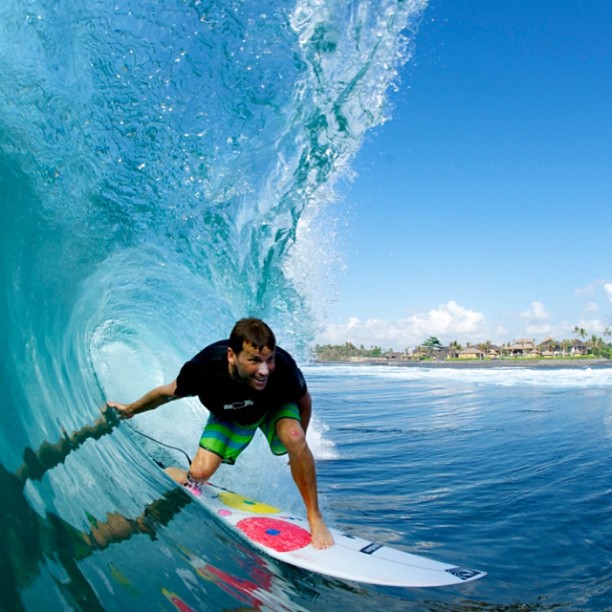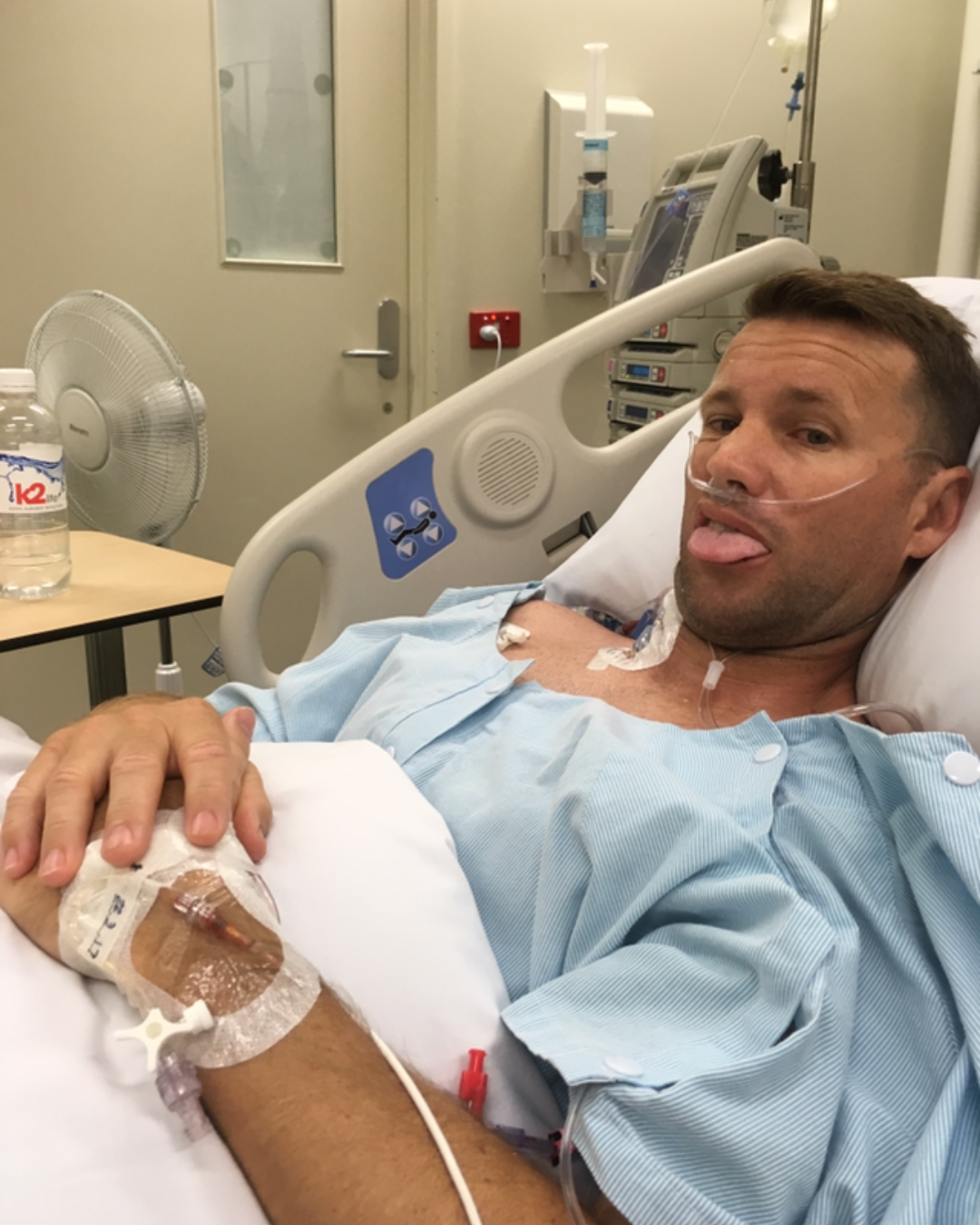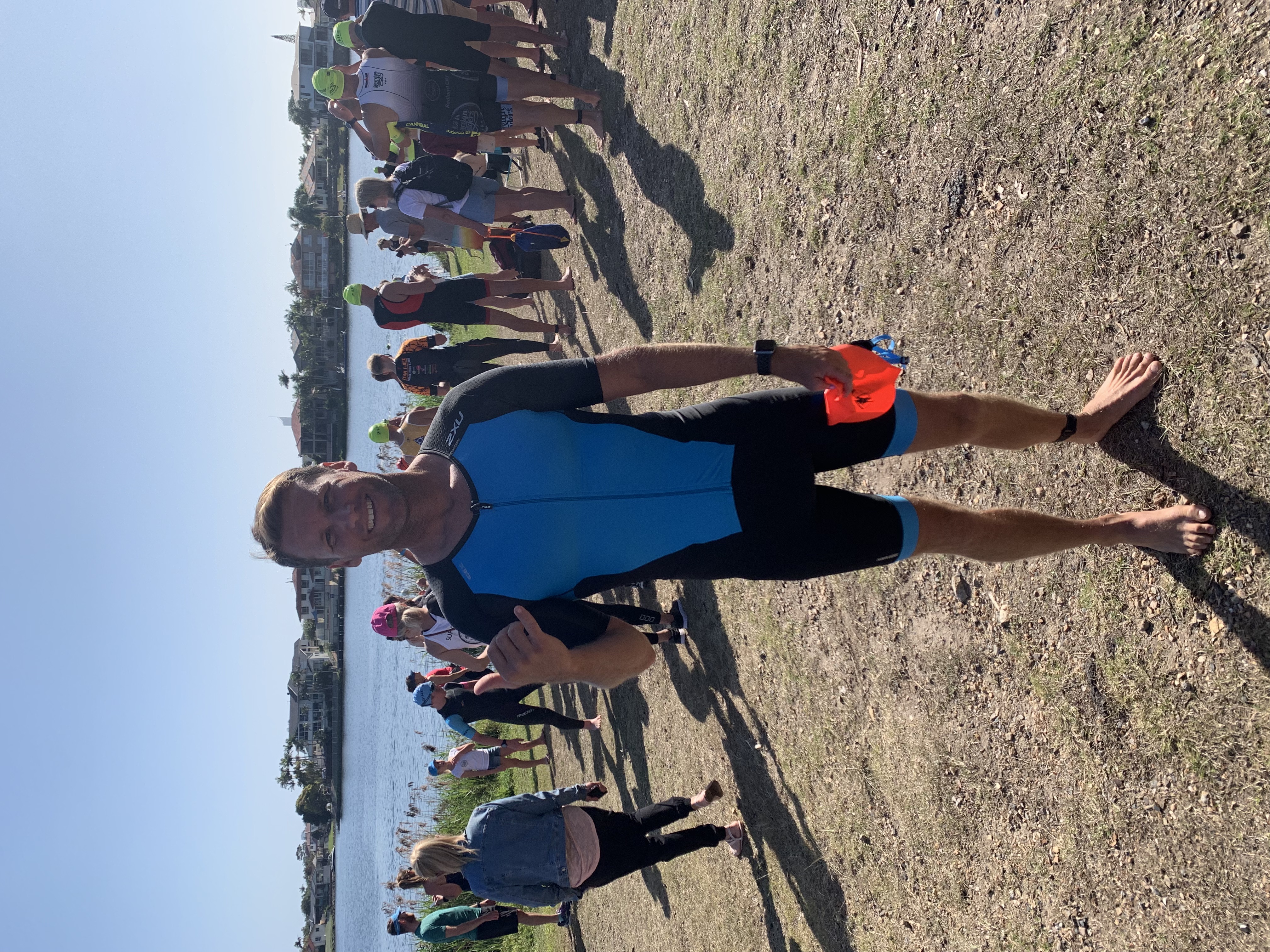Andrew's story
Meet Andrew, a long-term Mater patient and fellow B2GC rider.

Meet Andrew
To the pre-dawn walkers, Andrew Duke looks like any other young, healthy surfer expertly navigating the Gold Coast breaks before hitting the road in preparation for the 100km B2GC.
But every second Monday, the 42-year-old heads to the Mater Cancer Care Centre at South Brisbane for a 90-minute immunotherapy infusion—a routine he’s followed diligently for almost five years.
“I actually don’t mind because it gives me a chance to relax, unwind and just be still, which I rarely did before I had cancer,” Andrew says.
The infusions have so far kept his last three remaining lung tumours at bay and with minimal side effects.
It’s nothing short of a miracle for a man handed a veritable death sentence in 2017, aged just 36.
The shock diagnosis followed x-rays, ultrasounds, MRIs, blood tests, cortisone injections and finally a hip operation in search of answers for three years of “relentless” lower back and hip pain.
“But instead of being back on the bike within three months, I couldn’t even lift my leg into the car,” he recalls.
Finally, after another 10 months of persistent rehab, a third sports physician sent Andrew for more tests, suspecting a potential hernia. It was clear something was amiss when he was summoned back to her office after-hours.
With two of his brothers already on their way to pick him for their older brother’s birthday dinner, Andrew’s main worry before the hastily arranged follow-up appointment was being late.
“She looked me in the eye and told me I had stage four renal cell carcinoma. My first dumb question was, ‘Is stage four bad?’ And then she told me it had spread to my lungs. Both of them,” he recounts.
“And I just kept thinking, I’m supposed to be at dinner. I broke down. I had no idea how to tell my brothers, so she rang them for me.
“I felt sorry for her because she was a sports physician used to telling people they had a torn hamstring—not a terminal illness.”
The boys’ mum was in Brisbane for a quick visit, but her joy at seeing her four boys was short-lived. As a former nurse, Margaret knew exactly what her son’s diagnosis meant.
“I’ll never forget that, seeing her just break like that,” Andrew said.
The next morning, Andrew woke at his usual 5am, enjoying a brief moment before his new reality kicked in.
“I lay there and shed a few tears. Not the big ugly tears a mother makes when she finds out the news her son is dying, just the small tears that you make when watching a movie… like Me Before You or the The Notebook,” Andrew jokes—something he’s tried to do throughout his cancer journey.

“I let myself cry for a few minutes before I told myself crying wasn’t going to help. Being angry wasn’t going to cure me and being worried wasn’t going to help me either.
“That realisation had a huge impact on my mental health and motivated me to keep living life as normally as I could, so I forced myself to get out of bed and put my gym gear on. I dragged my twin brother along as well.”
Andrew successfully had his right kidney (and tumour) and adrenal gland removed just three weeks later, but his lung tumours were growing in size and number.
Chemotherapy doesn’t work on renal cancer, and despite other treatment options, just eight percent of patients will live past five years.
Andrew was invited to participate in an immunotherapy trial for a new drug too risky for Andrew’s doctors to support. Instead, they decided on the “gold standard” treatment for kidney cancer, which produced horrendous side effects.

“I was violently ill the whole time. Diarrhea, vomiting, blood-noses, mouth ulcers, my eyes deteriorated to the point I could barely see, and the fatigue was indescribable,” he explains.
Within a month his hair and skin lost all pigment and his thyroid stopped working. His body was breaking down, but the drug seemed to be working—his tumours were starting to shrink.
“You go from lifting weights, and then all I could use was resistance bands, and then all I could do was walk,” he shares.
“I would set myself small goals. Ok well, I can try and just make it to this coffee shop. It was the only thing I could control.”
The side effects became so debilitating, Andrew couldn’t risk leaving his apartment. His once-healthy body continued to shut down.
After eight months, scans revealed it had all been in vain—his tumours had doubled in size, and the drug would kill him first anyway.
Fortunately, the trial immunotherapy treatment he’d considered earlier had made it onto the PBS. It was Andrew’s only remaining option, and within weeks it began to make its mark. His side effects quickly dissipated and within months, his tumours had reduced from ten to four and all had shrunk.
A course of radiation reduced them even further, and for the first time in a long time, Andrew could start rebuilding his health, and his life. He will remain on the infusions as long as they keep working.
“This drug is the direct result of research,” Andrew said.
“And yes, I still have cancer, but I’m living with cancer. If it hadn’t made it on to the PBS, I wouldn’t be here, and lots of other patients wouldn’t be here. It’s why we have to keep supporting research. We have to keep trying.”












